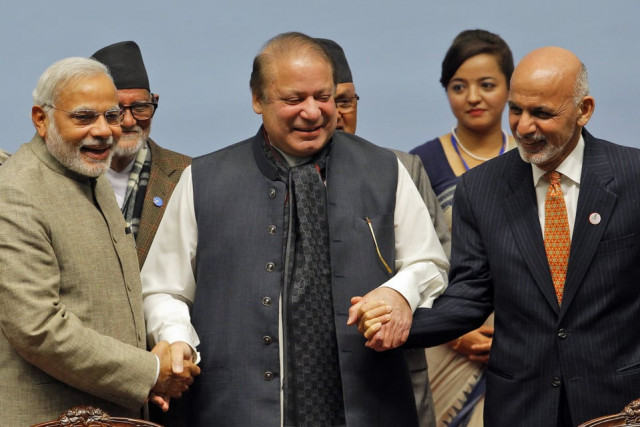No end to terrorism without better Pakistan-Afghanistan-India ties
Regional cooperation seems like the obvious strategy but mistrust between the neighbours is preventing peace.

A file photo of Prime Minister Nawaz Sharif, Indian Prime Minister Narendra Modi and Afghanistan President Ashraf Ghani during 18th SAARC meeting in Nepal. PHOTO: REUTERS
In the last 16 years, scores of terror attacks have killed about 61,700 people in Pakistan. Military operations, particularly Zarb-e-Azb, have reduced violent incidents by over 65 per cent but the threat still looms, as witnessed in February, which saw a string of bombings in different parts of the country. The newly launched operation Radd-ul-Fasaad is likely to further reduce terror-related violence in Pakistan but cannot eliminate it completely.
Radd-ul-Fasaad to consolidate gains of previous operations: ISPR chief
Similarly, India has suffered the Mumbai attacks, assaults on its parliament and security forces, as well as the recent Uri incident. Afghanistan is also witnessing severe militancy with heavy civilian causalities; Islamic State and other terror outfits with global agendas are also active in the country.
In such a situation, cooperation between regional countries on counterterrorism seems like the obvious strategy, but mistrust between Islamabad, Kabul, and New Delhi is preventing these nations from bringing terror activities to a halt.
Suspicion and distrust
Kabul and New Delhi both accuse Pakistan of not taking action against certain groups such as Taliban and Haqqani network – blamed for launching attacks in Afghanistan – and Jamatud Dawa, Lashkar-e-Taiba, and Jaish-e-Mohammad, which are fuelling the insurgency in Kashmir.
So unsurprisingly, India blames Pakistan for attacks in Uri and Mumbai and has also expressed reservations over how alleged culprits are tried in Pakistan. This mistrust has prevented Pakistan and India from having a dialogue over their outstanding issues including terrorism.
The suspicion is, of course, not one-sided. In addition to rebuffing accusations by its neighbours, Pakistan accuses India of meddling in the country’s internal affairs by supporting and financing terror outfits in Pakistan, and blames Afghanistan for not doing enough to tighten the noose around terror outfits that target Pakistan from across the border.
Pakistan unwilling to compromise with Afghanistan on terrorism: Asif
As these three countries continue to bicker, cooperation against terrorism has taken a backseat leaving a smooth field for terrorists to wreak havoc in the region.
How to cooperate
One important step in the fight against terrorism is to stop the movement of terrorists between Pakistan and Afghanistan through effective border management. Further, blocking SIMs and intelligence sharing will strengthen counterterrorism strategies and make them more effective. With cooperation already underway with regard to Islamic State, the armies of Pakistan and Afghanistan should now extend this collaboration to other groups such as Tehreek-e-Taliban Pakistan (TTP), Jamaatul Ahrar, Afghan Taliban and Haqqani network.
With India, where ties are a bit more complex due to Kashmir issue, Pakistan can still work with the country for defeating terrorism. At the end of sixth ministerial conference of Heart of Asia in December last year, both the countries signed the Amritsar Declaration which declares Islamic State and its affiliates, Haqqani network, al Qaeda, Islamic Movement of Uzbekistan, East Turkistan Islamic Movement, Lashkar-e-Taiba, Jaish-e-Mohammad, TTP, Jamaatul Ahrar and Jundullah as terror outfits; they both have also agreed to cut off financing to these groups. Implementation of this agreement with sincerity will help improving ties between Pakistan and India who must also end propaganda against each other and resume peace dialogue.
Role of regional heavyweights
As persistent mistrust between Pakistan, Afghanistan and India makes fighting terrorism difficult, other players in the region – such as Russia, China, US and Iran – have shown interest in playing their part to revamp ties and improve cooperation.
Pakistan still central to US Afghan strategy
Moscow and Tehran have a good relationship with Islamabad and New Delhi respectively and they can play a positive role in easing tensions. They have, along with Washington, London and Beijing, offered to mediate between India and Pakistan in this regard and launched significant measures - meeting between Pakistan-Afghan officials in London, launching of Quadrilateral Cooperation and Coordination Mechanism by China and six-party meeting hosted by Russia are all part of efforts to bring Pakistan, India and Afghanistan closer and improve anti-terrorism cooperation.
These bigger players must also ensure implementation of Amritsar Declaration which, as discussed above, can remove mistrust and enhance cooperation inevitably.
Imdad Hussain is an Islamabad-based journalist specialising in diplomatic and security issues.



















COMMENTS
Comments are moderated and generally will be posted if they are on-topic and not abusive.
For more information, please see our Comments FAQ